In a society where child sexual abuse remains a largely unspoken issue, public awareness campaigns targeting child sexual offenders are not just necessary—they are crucial. Ms. Pooja Taparia, Founder and Chief Executive, Arpan, has been at the forefront of this battle, tirelessly working to break the silence and empower communities.
Arpan, a pioneering organization dedicated to eradicating child sexual abuse, has developed comprehensive interventions that range from prevention and healing to legal advocacy and societal awareness. In this exclusive interview with TheCSRUniverse, Ms. Taparia sheds light on the driving forces behind Arpan’s impactful initiatives, the challenges of addressing a deeply rooted social stigma, and the transformative power of education and awareness in protecting children.
As we navigate through the nuances of Arpan’s mission, Ms. Taparia also shares personal insights into the journey of building a movement that not only confronts abusers but also equips survivors with tools for recovery and resilience. This conversation is an urgent call to action for all stakeholders—families, educators, policymakers, and the general public—to join hands in creating a society where every child is safe, valued, and heard.
Join us as we explore the stories, struggles, and triumphs that define Arpan’s relentless pursuit of justice and safety for children across the nation:
Q. What inspired Arpan to conceptualize the #ProtectedByPOCSO campaign, and how does it align with the organization's overarching mission? What were some of the most unexpected challenges you faced when creating and launching this campaign? How were these overcome?
A. At Arpan, preventing Child Sexual Abuse (CSA) and healing those affected by it are at the core of everything we do. A 2007 study by the Ministry of Women and Child Development cites around 50% of children in India experience some form of sexual abuse, and NCRB data from 2022 shows 187 cases are reported daily, with offenders being known to the child in 97% of cases. Despite these alarming facts, societal silence persists due to lack of awareness, cultural norms emphasising obedience, and denial that abuse could occur within family and / or familiar circles. To break this silence, Arpan’s annual Child Safety Week campaign focuses on awareness and cultural change. The past campaigns focused primarily on children themselves and parents, teachers and other adult stakeholders. However, with 42% of crimes against children being sexual offenses (NCRB 2022), we recognised the need for a mass media campaign directly targeting offenders. This led to the conceptualisation of the #ProtectedByPOCSO campaign, India’s first large-scale campaign by a non-profit to address offenders directly.
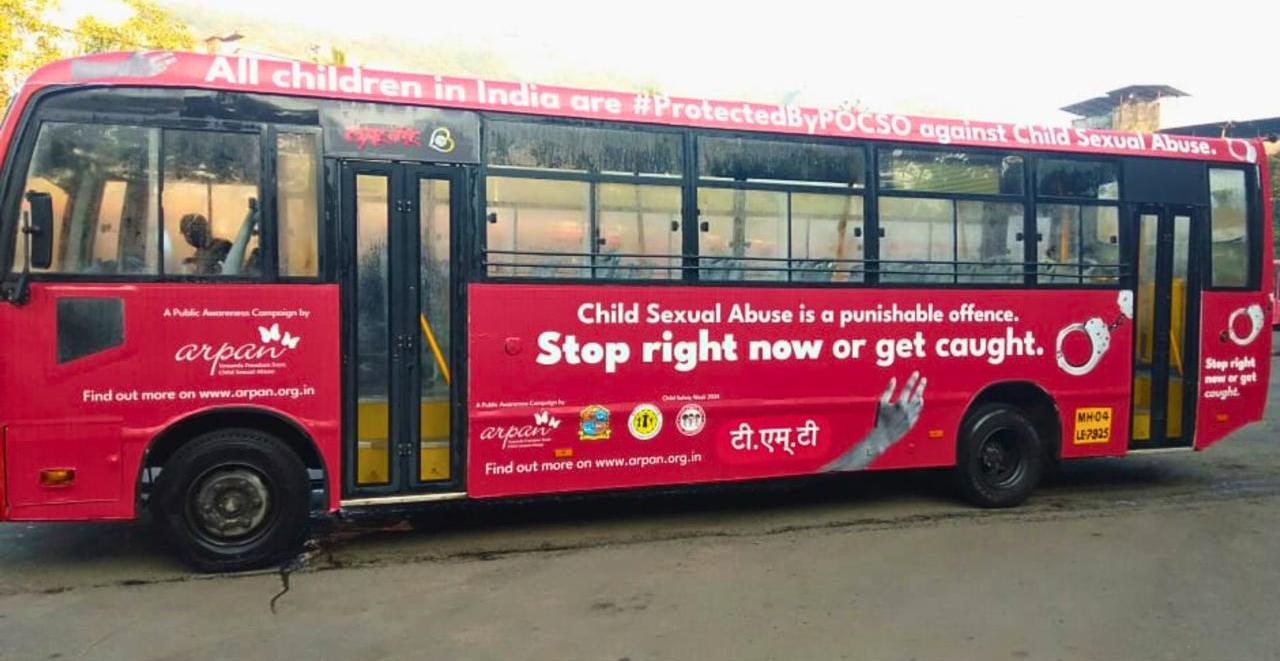 The campaign leverages the Protection of Children from Sexual Offenses (POCSO) Act 2012 to send a powerful message: "Child Sexual Abuse is a punishable offense – Stop Right Now or Get Caught." By emphasising the legal and social consequences of the POCSO Act, we aim to deter offenders and strengthen the community’s resolve to act against CSA. Global evidence, such as the success of Stop It Now! campaigns in the US, UK and Ireland, supports the effectiveness of targeted media in reaching offenders and redirecting them to stop abusing and seek help. With this premise, Arpan’s #ProtectedByPOCSO campaign was designed.
The campaign leverages the Protection of Children from Sexual Offenses (POCSO) Act 2012 to send a powerful message: "Child Sexual Abuse is a punishable offense – Stop Right Now or Get Caught." By emphasising the legal and social consequences of the POCSO Act, we aim to deter offenders and strengthen the community’s resolve to act against CSA. Global evidence, such as the success of Stop It Now! campaigns in the US, UK and Ireland, supports the effectiveness of targeted media in reaching offenders and redirecting them to stop abusing and seek help. With this premise, Arpan’s #ProtectedByPOCSO campaign was designed.
Unexpected challenges included crafting messaging that was bold enough to deter offenders yet sensitive towards survivors, and ensuring consistency across multiple communication channels. These challenges were addressed through advice from and consultations with experts, and leveraging Arpan’s strong partnerships during both the design and execution phases. This campaign reflects our commitment to primary prevention – stopping abuse before it happens, while fostering a collective stand against CSA.
Q. The uniform installation concept is innovative and impactful. Could you share the thought process behind this approach and how it has resonated with schools and communities?
A. The uniform installation was conceptualized as a symbolic yet powerful reminder that schools are safe spaces for children. A 2021 report by the Department of School Education and Literacy, Ministry of Education, India, states that around 26.5 crore (265 million) children are enrolled in schools from Pre-primary to Grade 12. While schools should be safe spaces for children, the recent incidents of CSA in school premises often contradict it. This further urges us to take collective action to assure our children that schools are not just centres of education but also safe spaces where children need to learn about their rights, personal safety, and how the law protects them under the POCSO Act. To drive home the message that CSA is off-limits for children, inside and outside schools, we garnered the support of over 160 schools in Maharashtra, Chhattisgarh, Goa, and Andhra Pradesh. These schools proudly displayed school uniforms at their gates with the caption ‘All children in India are #ProtectedByPOCSO’ and an accompanying poster sending out a bold message to offenders, ‘Stop Right Now or Get Caught.’
These striking uniform installations and posters highlighting the campaign messages served as a visual reminder that offenders will face severe legal consequences under the POCSO Act. This visual representation of school uniforms at the gates of the respective schools was designed to spark critical conversations among parents, educators, and community members. Schools, as Arpan’s long standing partners, were uniquely positioned to reinforce this message, bridging the gap between institutional safety and public accountability. The school uniform installations have been met with overwhelming support, with schools reaffirming their commitment to protecting children.
Q. What steps are being taken to raise awareness about the POCSO Act among children, parents, and communities to ensure early identification and protection against abuse? Additionally, could you share the specific objectives of the #ProtectedByPOCSO campaign during Child Safety Week, the outcomes you aim to achieve, and how Arpan engaged schools across states despite any challenges faced?
A. To ensure early identification and protection against Child Sexual Abuse, Arpan actively works with schools, parents, educators, and community stakeholders through its flagship Personal Safety Education (PSE) programme. This programme equips children with critical life skills such as decision-making, resilience, and self-awareness and helps them identify unsafe situations, refuse them and seek help. This curriculum introduces the POCSO Act from Grade 7 onwards, equipping children with knowledge about their rights and protections. Additionally, adult stakeholders—parents, teachers, and caregivers—are trained to recognise signs of CSA and effectively support children.
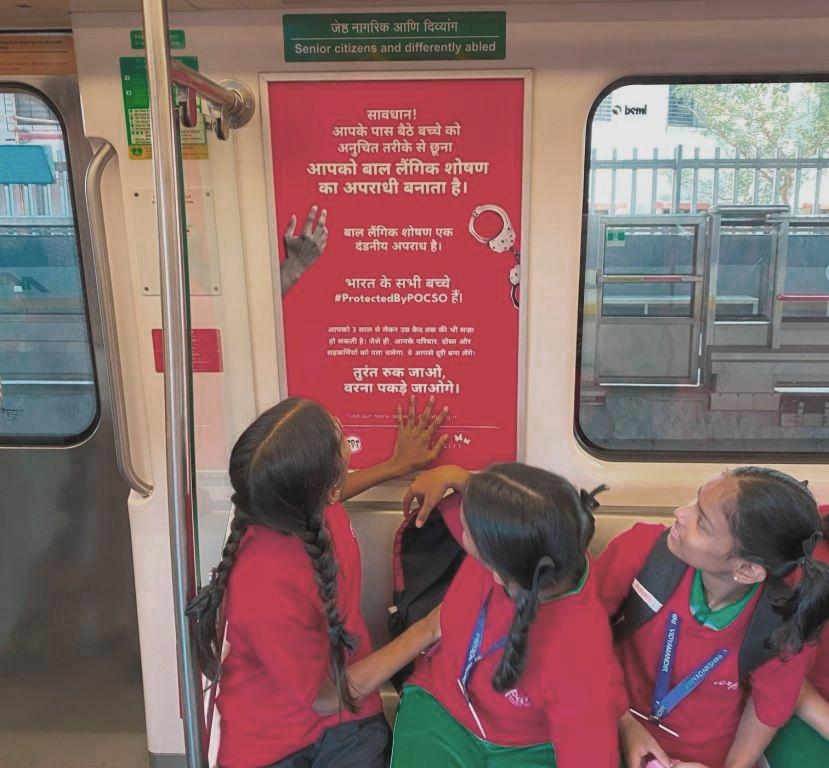 The objectives of the #ProtectedByPOCSO campaign are to:
The objectives of the #ProtectedByPOCSO campaign are to:
- Deter Child Sexual Offenders: Send a direct and powerful warning to offenders that CSA is a punishable offence, and they will face severe legal and social consequences under the POCSO Act.
- Raise Awareness: Collaborate with different stakeholders, including law enforcement, public transport systems, media, celebrities/influencers, schools, etc. to educate the public about the different acts that constitute CSA and about the consequences under the POCSO Act.
Behaviour and socio-cultural norms change is hard work and takes many years to show measurable impact. While outcomes will take a longer time to measure, the campaign was enthusiastically taken up by over 160 schools across 4 states in India and has had a reach of over 50 million and still counting. Even if one offender somewhere has been deterred after coming across the campaign, we believe the campaign has been a huge success.
Q. How has Vidya Balan’s role as Goodwill Ambassador amplified the #ProtectedByPOCSO campaign's reach and message?
A. Vidya Balan, as Arpan’s Goodwill Ambassador, has significantly amplified the reach and impact of the #ProtectedByPOCSO campaign. Since 2018, she has been a steadfast supporter of Arpan’s mission, lending her voice and credibility to bring attention to the issue of CSA. This year too, she kickstarted the campaign by sharing a compelling video message on social media platforms, where she directly addressed offenders. This widely shared message has drawn more attention and energy to the campaign.
Q. With over 150 professionals working at Arpan, how do you ensure a comprehensive approach to preventing and addressing CSA across diverse communities? In addition to educating children, what strategies does Arpan use to train and empower parents, educators, and other stakeholders to prevent and address CSA effectively?
A. Arpan’s comprehensive approach to preventing and addressing CSA is rooted in a multi-pronged strategy that involves children, parents, educators, and the wider community. With a team of over 150 professionals, Arpan works systematically to create an ecosystem of awareness, prevention, and response, focusing on both immediate and long-term solutions. At the heart of this approach is the PSE Programme, which is delivered through existing school networks to ensure structured, age-appropriate learning for children.
Key components of this approach include:
- Personal Safety Education for Children: Empowering children with knowledge and skills to recognize, resist, and report abuse.
- Sustainable Learning through Reinforcement: Revisiting the same children every 2–3 years to reinforce and expand upon key safety concepts.
- Post-Disclosure Support: Offering counselling and assistance to children who disclose abuse and providing guidance to those who have crossed boundaries, helping them reform their behaviour.
- School-Based Interventions: Partnering with schools to create a protective environment by sensitizing teachers, management, and support staff to child safety concerns.
This comprehensive framework ensures that the responsibility for child safety is shared and integrated into the fabric of a child’s ecosystem, creating safe environments where children can thrive.
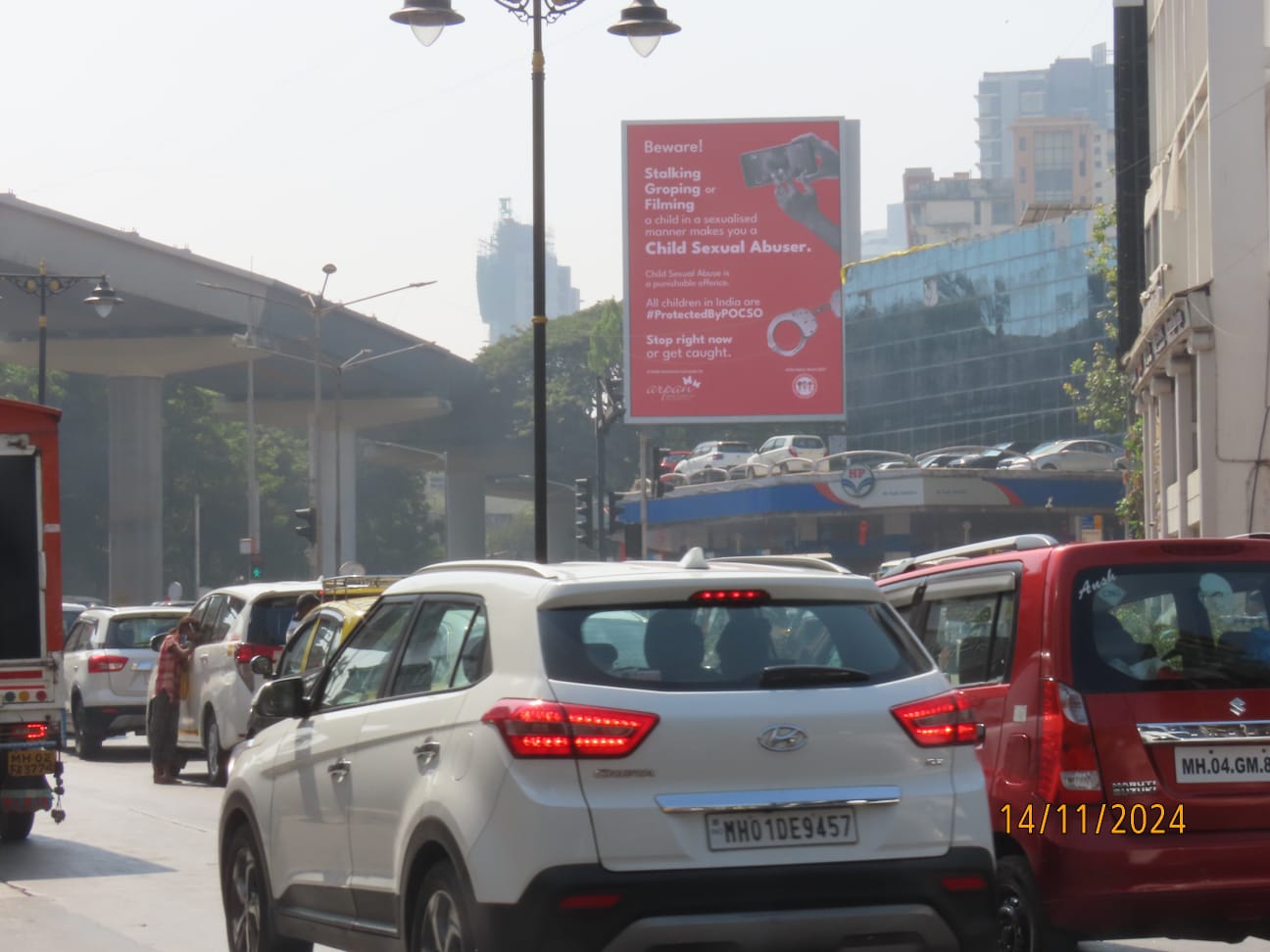 Strategies to Train and Empower Stakeholders: In addition to educating children, Arpan places significant emphasis on training and empowering parents, educators, and other key stakeholders. These efforts aim to build a network of informed, supportive adults who can proactively prevent CSA and respond effectively when necessary. By addressing stakeholders' knowledge gaps and equipping them with tools for intervention, Arpan creates a unified, community-driven approach to child safety.
Strategies to Train and Empower Stakeholders: In addition to educating children, Arpan places significant emphasis on training and empowering parents, educators, and other key stakeholders. These efforts aim to build a network of informed, supportive adults who can proactively prevent CSA and respond effectively when necessary. By addressing stakeholders' knowledge gaps and equipping them with tools for intervention, Arpan creates a unified, community-driven approach to child safety.
Specific strategies include:
- Training for Stakeholders: Workshops for parents, teachers, and caregivers on recognizing signs of abuse, handling disclosures sensitively, and creating safe spaces for children.
- First Responder Training: Equipping social workers, law enforcement, and healthcare providers to handle CSA cases with empathy and care.
- Digital Training Resources: Using e-learning modules and webinars to expand the reach of training programmes, especially to underserved communities.
- Advocacy Efforts: Collaborating with government bodies and educational authorities to integrate Personal Safety Education into state and national curricula.
Additionally, Arpan leverages public awareness campaigns to destigmatize discussions around CSA and encourage collective action. Campaigns like #ProtectedByPOCSO, as a part of Child Safety Week, engage communities through storytelling, social media, and events that bring attention to CSA and its prevention. Advocacy efforts extend to influencing systemic changes in policies and education systems to institutionalize child protection practices. By combining direct education with capacity-building and public awareness, Arpan ensures a holistic approach to combating CSA, fostering a culture where every child feels protected and supported.
Q. The Personal Safety Education (PSE) programme is one of your key initiatives. How does it empower children and adolescents to recognize and respond to unsafe situations? How has the launch of the e-learning portal broadened access to personal safety education, and what has been the feedback from users so far?
A. The PSE programme is central to Arpan's mission, equipping children and adolescents with the knowledge and skills to recognize and respond to unsafe situations. The programme focuses on empowering children by building essential life skills and fostering their confidence to safeguard themselves.
- Skill Development: The PSE programme teaches children key safety skills, such as recognizing boundaries, understanding consent, and identifying safe and unsafe touch. It equips them to speak up when they feel unsafe and to seek help from trusted adults without hesitation.
- Age-Appropriate Education: Tailored for children aged 4–18, the programme uses engaging, age-specific content to convey complex safety concepts in an accessible way. For younger children, the lessons are simplified, while older adolescents are introduced to more detailed discussions on relationships and personal safety.
- Building Confidence: PSE fosters a sense of self-assurance, enabling children to assert their boundaries and report any incidents of abuse confidently and without fear or shame.
Delivered through schools, communities, and institutions, the PSE programme also works with educators, parents, and support staff, fostering a holistic ecosystem that prioritizes child safety.
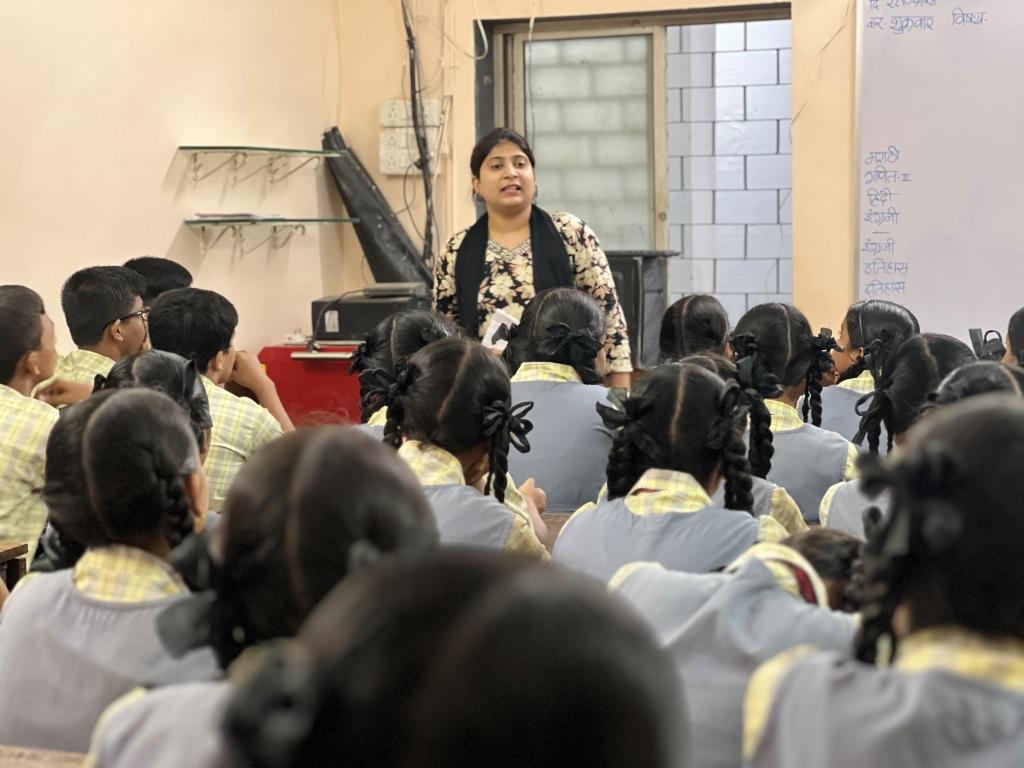 Broader Access Through the E-Learning Portal: The launch of the e-learning portal, www.arpanelearn.com, has revolutionized Personal Safety Education by breaking down barriers of geography and accessibility. This initiative has significantly expanded the programme’s reach, making child safety resources available to a global audience.
Broader Access Through the E-Learning Portal: The launch of the e-learning portal, www.arpanelearn.com, has revolutionized Personal Safety Education by breaking down barriers of geography and accessibility. This initiative has significantly expanded the programme’s reach, making child safety resources available to a global audience.
Expanding Reach: The portal provides free, interactive, and child-friendly resources, enabling children from underserved areas and countries like the Philippines and Guatemala to benefit from personal safety education. This is particularly impactful in remote areas where in-person training is limited.
Flexible Learning: With self-paced modules and the ability to revisit content, the portal allows learners to engage with the material in a way that fits their schedules and learning environments.Global Impact: By adapting its content to suit local contexts, the e-learning portal ensures its relevance across diverse cultures, thereby amplifying its impact beyond India.
Q. Arpan has partnered with various government bodies, NGOs, and school chains. Could you elaborate on the importance of these collaborations in scaling your initiatives?
A. Arpan’s collaborations with government bodies, NGOs, school chains, and other organizations play a crucial role in expanding the reach and sustainability of its initiatives to prevent Child Sexual Abuse (CSA) and support survivors. These partnerships ensure the integration of programmes into systemic frameworks and foster long-term impact.
Expanding Reach and Accessibility
- Government Bodies: Partnerships with entities like Ministries of Health, Education, Women and Child Development, NCERT, SCERT, and CBSE integrate Arpan’s PSE content into national and state curricula, reaching millions of children across India.
- Schools: Collaborating with over 250 schools enables large-scale implementation of the PSE programme and offers a platform for piloting and refining new modules.
Institutionalizing CSA Prevention
- Curriculum Integration: Embedding PSE into life skills curricula ensures a structured and sustained approach to CSA prevention.
- Policy Advocacy: Collaborations with government bodies strengthen efforts to drive systemic changes prioritizing CSA prevention.
Leveraging Networks for Scalability
- NGOs and CSOs: Partnerships with over 600 organizations replicate the PSE programme across rural, urban, and marginalized communities, extending Arpan’s reach to vulnerable populations.
- Awareness Campaigns: Initiatives like Child Safety Week amplify awareness, fostering a nationwide movement for child protection.
Enhancing Digital and Global Reach
- E-Learning Portal: Collaborations with digital platforms expand access to Arpan’s e-learning modules globally, including in countries like the Philippines and Guatemala, adapting content for cultural relevance.
Building Capacity and Ensuring Sustainability
- Training Programmes: Partnerships with schools, NGOs, and government bodies create a network of trained educators, caregivers, and first responders equipped to prevent and address CSA.
- Embedding into Systems: Collaborations ensure programmes are institutionalized and function independently over time, fostering sustainability.
Through these strategic collaborations, Arpan scales its initiatives, strengthens systemic change, and ensures widespread, sustainable impact in its mission to protect children from abuse.
Q. How did Arpan strategize the multi-channel approach for #ProtectedByPOCSO, including partnerships with public transportation systems, billboards, and online platforms? Why was it important to involve schools as the central focus of the campaign? How does this contribute to fostering a culture of vigilance and accountability?
A. The target audience for #ProtectedByPOCSO spans all demographics, necessitating a multi-channel approach. Since offenders can be anyone, we wanted to ensure that our messages are present across multiple channels so that the possibility of them being seen and registered increases. By leveraging public spaces like buses, metro and local trains, and cinema theatres, alongside OTT and social media platforms, Arpan ensured the campaign reached diverse groups. Messaging was customized for each channel to maximize relevance and impact.
Schools, as trusted community partners, became integral to extending the campaign’s reach. By engaging parents, teachers, and students, Arpan not only reinforced vigilance but also reassured children that they have a safe space to seek help. This holistic approach fosters both accountability and confidence in the community’s role in child safety.
Q. CSA is a sensitive topic in many communities. How does Arpan address cultural barriers and stigma to ensure open dialogue and participation? What mechanisms are in place to ensure children feel safe and supported when reporting incidents of CSA through your programmes?
A. Arpan takes a multi-faceted approach to addressing cultural barriers and stigma, ensuring open dialogue and participation while creating safe, supportive spaces for children to report incidents of Child Sexual Abuse (CSA). The organization works to challenge taboos and foster trust among communities, families, and educators.
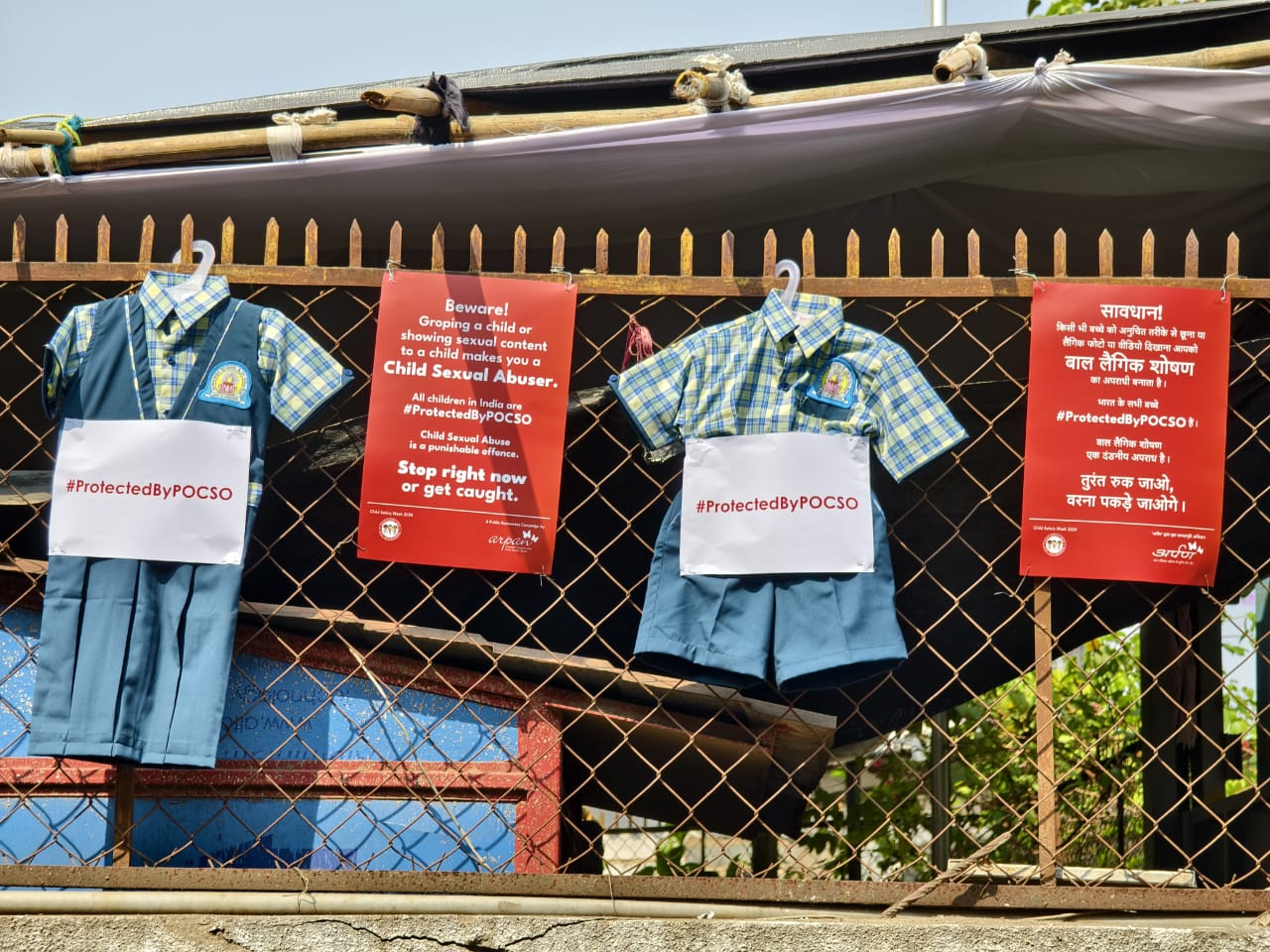 Addressing Cultural Barriers and Stigma
Addressing Cultural Barriers and Stigma
- Raising Awareness: Campaigns like Child Safety Week and public initiatives normalize discussions on CSA, challenging societal taboos and promoting acceptance of CSA prevention and mental health support.
- Engaging Families and Educators: Arpan conducts training and workshops for parents, caregivers, and educators to dispel misconceptions about CSA and mental health. These efforts equip stakeholders to support children effectively.
- Cultural Sensitivity: Programmes are designed to respect local norms, ensuring they resonate with diverse communities. This culturally sensitive approach encourages participation and reduces stigma.
Ensuring Safe Reporting Mechanisms for Children
- Child-Friendly Reporting Channels: Arpan provides accessible, age-appropriate mechanisms for children to report CSA. Sessions educate children on identifying safe adults and understanding their rights.
- Confidential and Supportive Systems: Counselling services prioritize confidentiality, ensuring children’s disclosures are handled with utmost care and sensitivity.
- Training Stakeholders: Teachers, caregivers, and first responders are trained to handle disclosures with empathy and professionalism, ensuring children feel supported and heard.
Q. How does Arpan plan to sustain the momentum created by this campaign in the coming months? What innovations or technologies do you envision playing a role in CSA prevention and awareness in the future?
A. Given the limited resources non-profits have, especially towards narrative building or large-scale communications campaigns, Arpan aims to continue running smaller campaigns focused on primary prevention, targeting offenders and bystanders. These campaigns will combine less-resource-intensive digital and on-ground activations.
In the future, Arpan envisions several innovations and technologies playing a significant role in preventing and raising awareness about Child Sexual Abuse (CSA):
- Foster continued conversations around CSA prevention by exploring newer mediums for messaging and collaborating with diverse stakeholders.
- Scale Personal Safety Education (PSE) through online courses, making them accessible to children and adults across India and globally.
- Create interactive tools that provide counseling-like experiences for children and adults, addressing the gaps in access to professional therapy.
- Partner with social media companies and internet providers to safeguard children from online grooming, identify offenders, and remove harmful content.
- Expand outreach to schools nationwide, deepen government partnerships, and leverage technology to enhance access to safety education.
- Pioneer new research to establish baseline data on CSA prevalence and incidence at scale, while navigating the restrictions of mandatory reporting.
- Develop healing models for restorative justice by working with young offenders in schools and institutions.
- Leverage international expansion, potentially through digital courses, to drive greater impact in India while progressing toward a global vision of a world free of CSA.
With these innovations and strategic initiatives, Arpan aims to sustain and amplify the impact of its work, ensuring more children and adults are equipped with the tools and knowledge needed to prevent CSA and foster safer environments.
By addressing stigma, fostering trust, and creating secure reporting mechanisms, Arpan cultivates an environment where children feel empowered to seek help without fear or shame.




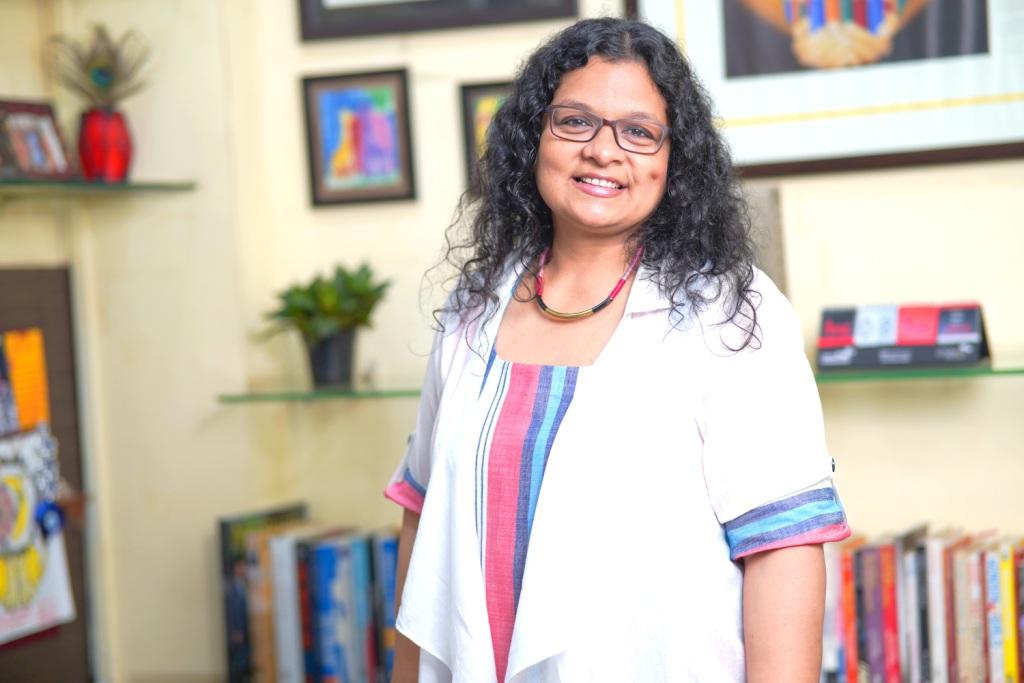
 The campaign leverages the Protection of Children from Sexual Offenses (POCSO) Act 2012 to send a powerful message: "Child Sexual Abuse is a punishable offense – Stop Right Now or Get Caught." By emphasising the legal and social consequences of the POCSO Act, we aim to deter offenders and strengthen the community’s resolve to act against CSA. Global evidence, such as the success of Stop It Now! campaigns in the US, UK and Ireland, supports the effectiveness of targeted media in reaching offenders and redirecting them to stop abusing and seek help. With this premise, Arpan’s #ProtectedByPOCSO campaign was designed.
The campaign leverages the Protection of Children from Sexual Offenses (POCSO) Act 2012 to send a powerful message: "Child Sexual Abuse is a punishable offense – Stop Right Now or Get Caught." By emphasising the legal and social consequences of the POCSO Act, we aim to deter offenders and strengthen the community’s resolve to act against CSA. Global evidence, such as the success of Stop It Now! campaigns in the US, UK and Ireland, supports the effectiveness of targeted media in reaching offenders and redirecting them to stop abusing and seek help. With this premise, Arpan’s #ProtectedByPOCSO campaign was designed. The objectives of the #ProtectedByPOCSO campaign are to:
The objectives of the #ProtectedByPOCSO campaign are to: Strategies to Train and Empower Stakeholders: In addition to educating children, Arpan places significant emphasis on training and empowering parents, educators, and other key stakeholders. These efforts aim to build a network of informed, supportive adults who can proactively prevent CSA and respond effectively when necessary. By addressing stakeholders' knowledge gaps and equipping them with tools for intervention, Arpan creates a unified, community-driven approach to child safety.
Strategies to Train and Empower Stakeholders: In addition to educating children, Arpan places significant emphasis on training and empowering parents, educators, and other key stakeholders. These efforts aim to build a network of informed, supportive adults who can proactively prevent CSA and respond effectively when necessary. By addressing stakeholders' knowledge gaps and equipping them with tools for intervention, Arpan creates a unified, community-driven approach to child safety.  Broader Access Through the E-Learning Portal: The launch of the e-learning portal,
Broader Access Through the E-Learning Portal: The launch of the e-learning portal,  Addressing Cultural Barriers and Stigma
Addressing Cultural Barriers and Stigma












.jpg)



